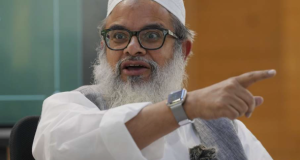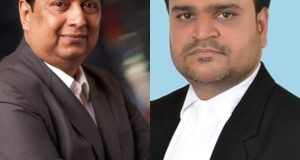Somnath Lands Where Demolitions Were Carried Out Won’t Be Allotted to Third Parties Till Next Hearing: Supreme Court
“Unilateral Demolition of Religious Sites Has Hurt Muslim Sentiments”: Maulana Mahmood Asad Madani
Press Release
October 25, 2024: The State of Gujarat assured the Supreme Court on Friday (October 25) that the lands in Somnath, where recent demolitions of structures were conducted by the authorities, would remain under government control and not be allotted to any third parties until the next hearing.
The bench, consisting of Justices B. R. Gavai and K. V. Viswanathan, scheduled the next hearing for November 11, during which a contempt petition alleging that the demolitions violated a previous Supreme Court order will also be addressed.
The petitioner, the Auliya-e-Deen Committee of Junagadh, initiated by Jamiat Ulama-i-Hind, raised concerns that several mosques, shrines, and graveyards were targeted while nearby temples remained untouched.
Senior Advocate Kapil Sibal, representing the petitioners, argued that the selective demolition of Muslim structures—claimed to be heritage sites—was indicative of communal bias. He emphasized that although these structures were on government land, they were registered as Wakf properties and held historical significance.
Sibal pointed out a previous order issued by the District Collector in 2015, which restricted the use of these lands to government purposes only. He alleged that the current attempts to transfer these lands to private parties violated this order and constituted an act of injustice, urging the court to issue a status quo order to prevent further transfers.
Solicitor General of India, Tushar Mehta, appearing for the Gujarat government, countered Sibal’s claims by asserting that the demolished structures were encroachments on public land and were not protected monuments.
Mehta accused the petitioners of withholding critical information from the court, asserting that the government’s actions were lawful. However, to address the court’s concerns, the Solicitor General assured that the lands would not be allotted to third parties and would remain under government control.
Justice Gavai noted the submissions and mentioned that the court could potentially order the restoration of the demolished sites if required. Upon hearing the Solicitor General’s assurance, the bench recorded that the possession of the land would remain with the government until further orders, thereby eliminating the need for an additional interim order.
Senior Advocate Huzefa Ahmadi, representing another petitioner, stressed that some of the structures were classified as ancient monuments and registered as Wakf properties, with documentation dating back to 1903. He warned that any change in possession could complicate the recovery of these lands and joined Sibal’s plea for a status quo order to prevent further high-handed actions by the authorities.
Jamiat Ulama-i-Hind President Maulana Mahmood Asad Madani responded to the developments, stating, “The demolition of ancient religious sites is an attack on the cultural and spiritual heritage of our country. What has happened in Saurashtra has deeply wounded the sentiments of Muslims across India. Governments should not act in a manner that appears unjust, especially concerning religious places.”
The lawyers representing Jamiat in court included Kapil Sibal, Huzefa Ahmadi, Ejaz Maqbool, Tahir Hakeem, and Saqib Ansari. Also present were Professor Nisar Ahmad Ansari, General Secretary of Jamiat Ulama Gujarat, along with other prominent officials such as Owais Bhai Sheikhani and Tabrez Bhai.
The case also garnered significant support from Haji Asif Khand, Ghyasuddin (former MLA), Nusrat Panja, and the Veeraval-Patan Muslim community.
Case: AULIYA-E-DEEN COMMITTEE Vs THE STATE OF GUJARAT | SLP(C) No. 24515/2024
 Times Of Pedia Times of Pedia TOP News | Breaking news | Hot News | | Latest News | Current Affairs
Times Of Pedia Times of Pedia TOP News | Breaking news | Hot News | | Latest News | Current Affairs




